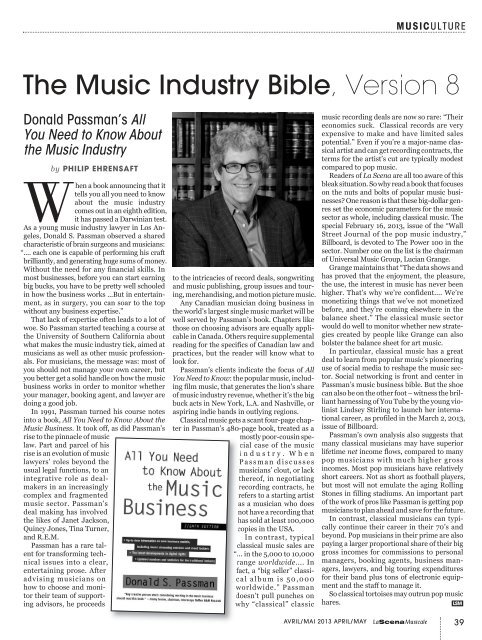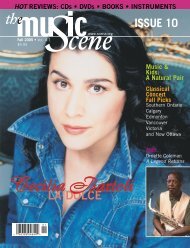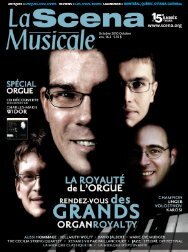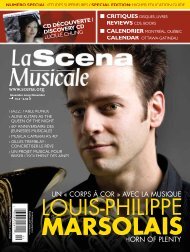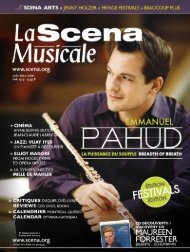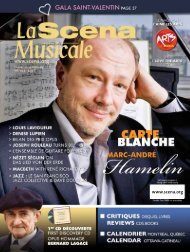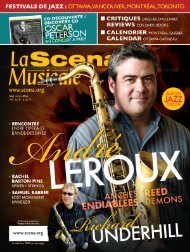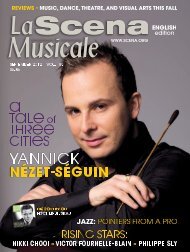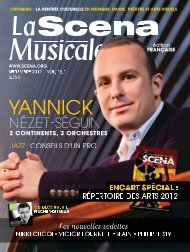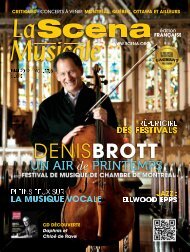Adobe Acrobat PDF complet (14 MB) - La Scena Musicale
Adobe Acrobat PDF complet (14 MB) - La Scena Musicale
Adobe Acrobat PDF complet (14 MB) - La Scena Musicale
You also want an ePaper? Increase the reach of your titles
YUMPU automatically turns print PDFs into web optimized ePapers that Google loves.
MUSICULTURE<br />
The Music Industry Bible, Version 8<br />
Donald Passman’s All<br />
You Need to Know About<br />
the Music Industry<br />
by PHILIP EHRENSAFT<br />
When a book announcing that it<br />
tells you all you need to know<br />
about the music industry<br />
comes out in an eighth edition,<br />
it has passed a Darwinian test.<br />
As a young music industry lawyer in Los Angeles,<br />
Donald S. Passman observed a shared<br />
characteristic of brain surgeons and musicians:<br />
“.... each one is capable of performing his craft<br />
brilliantly, and generating huge sums of money.<br />
Without the need for any financial skills. In<br />
most businesses, before you can start earning<br />
big bucks, you have to be pretty well schooled<br />
in how the business works ...But in entertainment,<br />
as in surgery, you can soar to the top<br />
without any business expertise.”<br />
That lack of expertise often leads to a lot of<br />
woe. So Passman started teaching a course at<br />
the University of Southern California about<br />
what makes the music industry tick, aimed at<br />
musicians as well as other music professionals.<br />
For musicians, the message was: most of<br />
you should not manage your own career, but<br />
you better get a solid handle on how the music<br />
business works in order to monitor whether<br />
your manager, booking agent, and lawyer are<br />
doing a good job.<br />
In 1991, Passman turned his course notes<br />
into a book, All You Need to Know About the<br />
Music Business. It took off, as did Passman’s<br />
rise to the pinnacle of music<br />
law. Part and parcel of his<br />
rise is an evolution of music<br />
lawyers’ roles beyond the<br />
usual legal functions, to an<br />
integrative role as dealmakers<br />
in an increasingly<br />
complex and fragmented<br />
music sector. Passman’s<br />
deal making has involved<br />
the likes of Janet Jackson,<br />
Quincy Jones, Tina Turner,<br />
and R.E.M.<br />
Passman has a rare talent<br />
for transforming technical<br />
issues into a clear,<br />
entertaining prose. After<br />
advising musicians on<br />
how to choose and monitor<br />
their team of supporting<br />
advisors, he proceeds<br />
to the intricacies of record deals, songwriting<br />
and music publishing, group issues and touring,<br />
merchandising, and motion picture music.<br />
Any Canadian musician doing business in<br />
the world’s largest single music market will be<br />
well served by Passman’s book. Chapters like<br />
those on choosing advisors are equally applicable<br />
in Canada. Others require supplemental<br />
reading for the specifics of Canadian law and<br />
practices, but the reader will know what to<br />
look for.<br />
Passman’s clients indicate the focus of All<br />
You Need to Know: the popular music, including<br />
film music, that generates the lion’s share<br />
of music industry revenue, whether it’s the big<br />
buck acts in New York, L.A. and Nashville, or<br />
aspiring indie bands in outlying regions.<br />
Classical music gets a scant four-page chapter<br />
in Passman’s 480-page book, treated as a<br />
mostly poor-cousin special<br />
case of the music<br />
industry. When<br />
Passman discusses<br />
musicians’ clout, or lack<br />
thereof, in negotiating<br />
recording contracts, he<br />
refers to a starting artist<br />
as a musician who does<br />
not have a recording that<br />
has sold at least 100,000<br />
copies in the USA.<br />
In contrast, typical<br />
classical music sales are<br />
“... in the 5,000 to 10,000<br />
range worldwide.... In<br />
fact, a “big seller” classical<br />
album is 50,000<br />
worldwide.” Passman<br />
doesn’t pull punches on<br />
why “classical” classic<br />
music recording deals are now so rare: “Their<br />
economics suck. Classical records are very<br />
expensive to make and have limited sales<br />
potential.” Even if you’re a major-name classical<br />
artist and can get recording contracts, the<br />
terms for the artist’s cut are typically modest<br />
compared to pop music.<br />
Readers of <strong>La</strong> <strong>Scena</strong> are all too aware of this<br />
bleak situation. So why read a book that focuses<br />
on the nuts and bolts of popular music businesses?<br />
One reason is that these big-dollar genres<br />
set the economic parameters for the music<br />
sector as whole, including classical music. The<br />
special February 16, 2013, issue of the “Wall<br />
Street Journal of the pop music industry,”<br />
Billboard, is devoted to The Power 100 in the<br />
sector. Number one on the list is the chairman<br />
of Universal Music Group, Lucian Grange.<br />
Grange maintains that “The data shows and<br />
has proved that the enjoyment, the pleasure,<br />
the use, the interest in music has never been<br />
higher. That’s why we’re confident.... We’re<br />
monetizing things that we’ve not monetized<br />
before, and they’re coming elsewhere in the<br />
balance sheet.” The classical music sector<br />
would do well to monitor whether new strategies<br />
created by people like Grange can also<br />
bolster the balance sheet for art music.<br />
In particular, classical music has a great<br />
deal to learn from popular music’s pioneering<br />
use of social media to reshape the music sector.<br />
Social networking is front and center in<br />
Passman’s music business bible. But the shoe<br />
can also be on the other foot – witness the brilliant<br />
harnessing of You Tube by the young violinist<br />
Lindsey Stirling to launch her international<br />
career, as profiled in the March 2, 2013,<br />
issue of Billboard.<br />
Passman’s own analysis also suggests that<br />
many classical musicians may have superior<br />
lifetime net income flows, compared to many<br />
pop musicians with much higher gross<br />
incomes. Most pop musicians have relatively<br />
short careers. Not as short as football players,<br />
but most will not emulate the aging Rolling<br />
Stones in filling stadiums. An important part<br />
of the work of pros like Passman is getting pop<br />
musicians to plan ahead and save for the future.<br />
In contrast, classical musicians can typically<br />
continue their career in their 70’s and<br />
beyond. Pop musicians in their prime are also<br />
paying a larger proportional share of their big<br />
gross incomes for commissions to personal<br />
managers, booking agents, business managers,<br />
lawyers, and big touring expenditures<br />
for their band plus tons of electronic equipment<br />
and the staff to manage it.<br />
So classical tortoises may outrun pop music<br />
hares.<br />
LSM<br />
AVRIL/MAI 2013 APRIL/MAY 39


